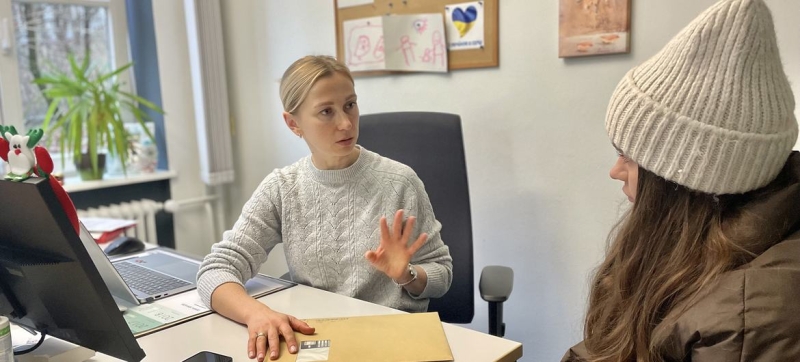
Katerina Gracheva (left) works as a consultant for migrants in Germany. Migration consultant Katerina Gracheva: “All refugees have one thing in common – uncertainty about the future” Anna Radomskaya Refugees and migrants
The number of refugees in the world continues to grow. One of the main reasons, according to the International Organization for Migration, is today the full-scale invasion of Russia into the territory of Ukraine. This has led to one of the largest migration crises since World War II, and Ukraine has become the second country in the world in terms of the number of refugees after Syria.
Germany remains one of the world’s leading countries that has accepted the largest number of people fleeing war – about 3.4 million forced migrants live here. Of these, more than a million are Ukrainian refugees, the rest are from Syria, Afghanistan, Iraq and other countries. The UN News Service reports on the problems they face, the assistance they need, how they adapt to new living conditions, why they return home despite the war, and what it’s like to be a migrant yourself.
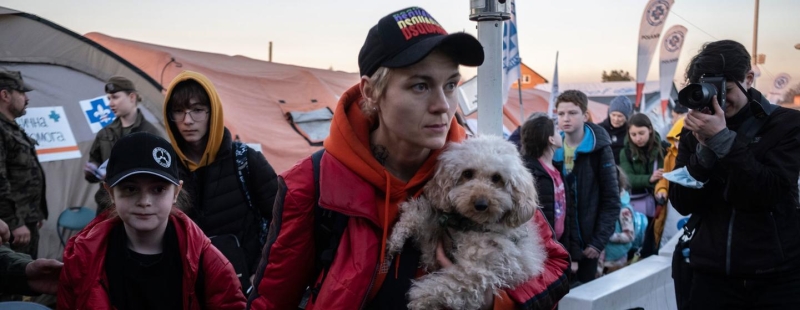
Refugees from Ukraine.
Most refugees were not ready to leave
“I work with refugees from different countries. In addition to Ukrainians, I have a lot of people from Syria, Afghanistan, Iraq, Iran, Somalia. All people are different, but all refugees have one thing in common – uncertainty about the future. These are people who left home and are trying to rebuild their lives. Of course, none of us knows what the future holds. But in this case, it is especially disorienting. After all, these are people who, for the most part, were not ready to leave. And now they don’t know what to do,” says Katerina Gracheva, a migration consultant and volunteer.
The 2022 migration wave made a “special impression”
Katerina has been helping migrants in Germany for many years. Over the past three years, the country has accepted a record number of refugees from different countries since World War II. The latest wave, which began in February 2022, made a special impression. “When the full-scale war in Ukraine began, it was a shock for everyone. My colleagues worked at night, all structures worked non-stop. No one was prepared, but we had to act very quickly. All employees, regardless of their position, met buses, distributed people, accommodated them – worked day and night. In short, it was a complete apocalypse,” Katerina recalls the end of winter and spring of 2022.
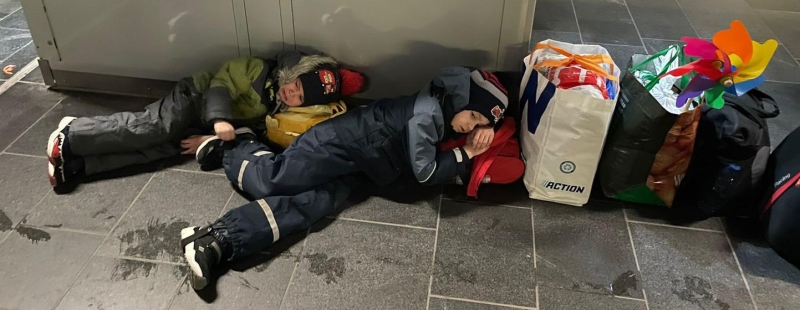
Children from Ukraine sleep on the floor of a train station in Germany.
“We have apartments, rooms. We really want to help”
The mayor of the village where she lived with her family then approached Katerina. “The mayor gathered volunteers and invited me to join. He said – we have apartments, rooms, we really want to help! We then housed 60 people in Osdorf. I was very worried about the people, worried with them – they were very confused. Then there was the very first and most terrible wave, when the Russian army occupied Bucha, Irpen, Gostomel and people fled in panic,” the girl says.
“It was non-stop help”
That time was incredibly difficult, all personal time became work. “Just a small episode. On Saturday morning, I was sitting at breakfast with my family and then a Ukrainian woman called me. Her little child had a bad toothache, but she didn’t know where to go on a weekend when everything was closed. I left breakfast and started looking for a doctor. And I managed to call a dentist who agreed to see them, and then a volunteer who was able to take them. In the end, the child got to the doctor, who said that another half hour would have swollen the gums, and this would have led to suffering for the whole weekend. And there were many such cases. Someone felt ill, we had to call an ambulance, take them to the hospital. It was non-stop work.” A little later, when people got used to it a little, it became easier. “As terrible as it may sound, people get used to everything. They got used to this war too,” Katerina states. “People started helping each other. Those who arrived earlier began to help the new arrivals. A whole coalition was formed in the village, where many found friends.”
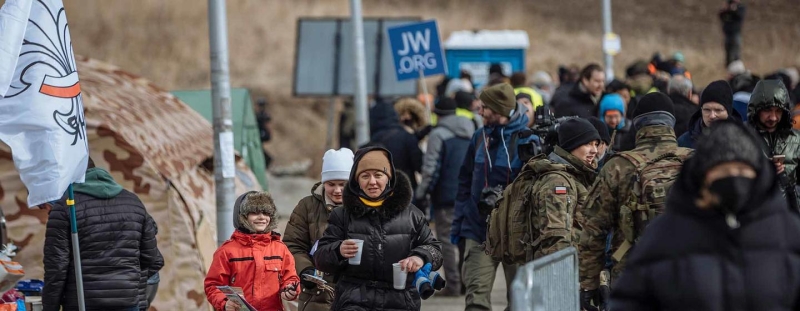
Ukrainian refugees on the border with Poland. “Of course, sometimes there are people who abuse hospitality. There is also social tourism, there is even a corresponding term. Because of this, someone leaves volunteer activities, becomes disappointed. But this does not mean that you need to stop helping others, because this is not the rule,” says the migration consultant. Katerina herself also once emigrated and has been living in Germany for 12 years. She has a family here – a husband and two children. “Initially, I was going to come temporarily, to learn the language, but then it turned out that I stayed. At that time, I already had a higher education, I graduated from the Polytechnic Institute. But at that time, I dreamed of a different profession – I wanted to work in the social sphere. I have been like this since childhood, I loved people, animals. I could give the last money that my mother gave me for bread to a grandmother passing by, and so on. But in Ukraine, the work of a social worker was low-paid, it was impossible to live on that kind of money. And I decided to get this education in Germany in order to work in this field here. Germany is a very social state, where I could realize myself professionally,” says Katerina.
“Emigration threw me back a lot”
“The first five years were very difficult,” says the girl. “After two years, I entered the phase when you are still a stranger here and already a stranger at home. I still wanted to go back to my old life, to my surroundings – to my family, friends, but I didn’t want to retreat either. I learned the language to the level that would allow me to get the education I had planned. I was in the country on a student visa and didn’t receive a penny from the state. Therefore, I had six jobs. I was a cleaner, a nanny. Waitressing didn’t suit me, because I wanted to communicate less. But when I was cleaning, no one bothered me and I could simultaneously listen to lectures recorded during university classes on my headphones.” Read also:
How the UN helps the most defenseless Ukrainian refugees in Moldova
“I got my bachelor’s degree at 30. And I arrived at 23 – at that time I already wanted to integrate into adult life, start working. But emigration threw me back a lot – I had to start again literally from the alphabet, like the first time in first grade. I had to feel like a child again in the literal sense. Therefore, I can perfectly imagine what it is like for people who find themselves in a situation where they have to start from scratch,” the girl says.
“People think I can do everything”
Today, Katerina’s job is to consult on absolutely all issues that arise for a person who has moved to live in Germany. “And these questions start with the most basic things – how to apply for unemployment benefits, how to enroll children in school, how to find a job or language courses, how to apply for health insurance, and even just see a doctor. My job is to help people cope with all of this, to sort out the documents, of which there are usually a lot here. In fact, I can be asked about anything, right up to the situation on the Polish border – the latest hit,” Katerina smiles. “Once people asked me to unblock their card in the banking system, to which, of course, I do not have access, because I am not a bank employee. In general, people think that I can do everything!”
“There was often crying in my office”
All refugees, no matter where they are from, have common features – confusion, helplessness, primarily mental, and also melancholy, irritation, – Katerina shares. – People give up. Very often I observed this “last straw” – it would seem that some piece of paper was lost or a comma was incorrectly placed in the text – and the person would break down. People often cried in my office. From helplessness – people thought that they were stupid, did not understand basic things. This upset them very much. And I understood this, empathized, tried to calm them down.”
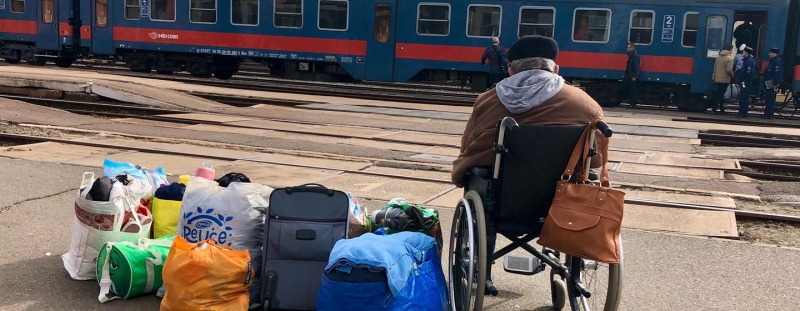
Ukrainian refugee at a station in Hungary.
Difficulties push people to return home, where there is war
Sometimes people cannot withstand the difficulties of emigration. The lack of housing and problems with employment push them to decide to return home, despite the ongoing hostilities and instability in the country. “I personally know many Ukrainians who, despite everything, went back. But some leave before the first bombing, and then return again. There are also tragic cases. I remember one family – a husband, wife and three children. I barely knew them. They lived in Berlin, but then they could not stand it and decided to return home. But we didn’t make it – we came under fire on the way to Kharkov and, unfortunately, everyone died,” the girl recalls.
Children adapt better than adults, but the elderly have the hardest time
Children usually adapt easier than adults. “I have an example – a boy who came with his mother from Kharkov two years ago. Today I was giving them a lift on the road and I even stopped when I heard the child speak to me in pure German without any accent. He is 9 years old. Of course, the younger the child, the easier it is for him. But the hardest of all are those people who are over 60. As a rule, they do not feel very confident in the Internet space, it is difficult for them to learn the language, they have health problems,” says the migration consultant.
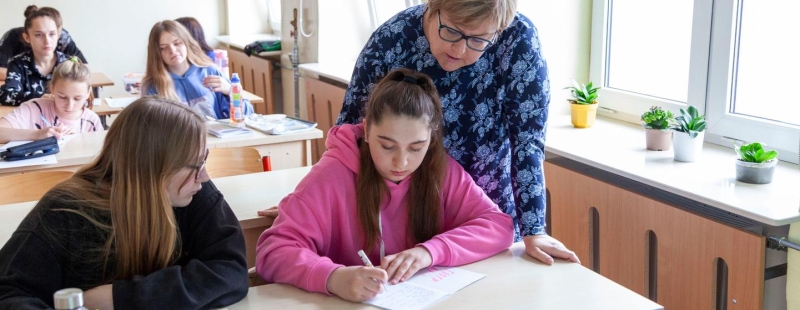
13-year-old Ukrainian refugee Sofia attends a geography lesson in Warsaw, Poland.
Accepting the country’s customs, learning the language and being independent is the key to everything
“All migrants have one more thing in common: they each bring a piece of their culture with them and try to enclose it in a cocoon,” says Katerina. “It’s like a personal window into a past world, into the place where a person was born, grew up and got used to. People often try to create a social circle from their own culture and are very happy when they find a store with familiar products. All of this is understandable, but at the same time, it is also an obstacle to integration. And if you want integration to be successful, you need to try to understand and accept the rules and customs of this country and learn the language as actively as possible – that’s the key to everything. You need to try to become independent as quickly as possible. People are often afraid of this because they are afraid of making mistakes. But there are no right decisions without mistakes.”
